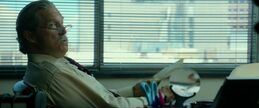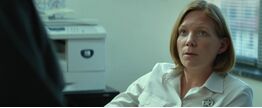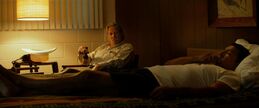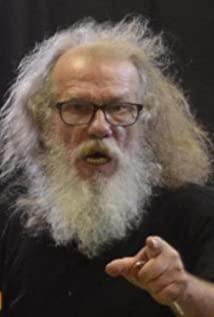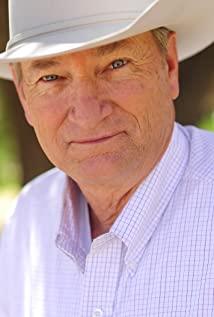As the weakest "existence" candidate in this year's Oscar best picture nominations, "Going Through Fire" doesn't have enough topic heat, dazzling handsome men and beauties like other competitors, or make you cry. love story, but that doesn't stop it from being called "the best western in years" or "the best bank robbery since "Hot Afternoon". Rated R, full of violence, foul language, and ultimately the "villain" has not yet received a bad Western, which is somewhat reminiscent of "No Country for Old Men" ten years ago, compared to the intense drama and stylization of the Coen brothers, " Going through fire and water is much more bland - the old cowboys in "No Country for Old Men" can still lick honey on the tip of a knife while missing the glorious days of their fathers. In "Going through fire and water", contemporary western cowboys can only In the tattered village banks, they show their prestige. This is the helpless reality that the film finally tells. The era of cowboys is long gone, and the "pseudo-cowboys" in the American West can only use their former unruly spirit to compete with this world that no longer believes in heroes. After all, this is the end of the cowboys.
Cowboy's Elegy
The story of "Going through fire and water" is not complicated. Brothers Tanner Howard and Toby Howard, one is an ex-convict released after serving his sentence, and the other is a poor man who divorced his wife. In modern society, they are full of "losers" , Desperate, they finally made the idea of a bank, put on ski masks, held two pistols, and the strategy of only looting loose money made them successful repeatedly. And the detective Marcus, who was in charge of chasing them, was not such a heroic messenger of justice: on the verge of retirement, alone, he could only spend his days fighting with his Indian partner. It is precisely these two characters who are confronted in the film. They are both at the bottom of the society, and they are both struggling to survive in a bad life. In a sense, they are all "descendants" of Western cowboys, but they all have the same impression as us. A far cry from the cowboys in the film, the film presents a bleak picture of the once-glorious West now: cowboys have become bank thieves robbing change, and police officers have become potbellied, sloppy old men. Such a comparison is doomed from the very beginning that the film will not be an exciting western shootout, but a tragic feeling for "the West is no more". No matter who wins or loses Howard Brothers or Marcus, the West is gone.
Going back to the protagonists of the film, Tanner and Toby are really just thieves, and they went down the road of outlaw robbers not like John Wayne-esque cowboys trying to punish evil and promote good, nor like gangsters in gangster movies. In order to make a name for themselves, they just want to grab enough money to redeem the farm that is about to be confiscated by the bank - very mundane and very realistic. They wanted to keep the farm because it was their mother's legacy, and Toby wanted to keep it for his son. This is a rather interesting setting: a farm in the Wild West, which is like a spiritual home for the cowboys, and what Toby desperately wants to defend, in exchange for his young son, only get the sentence "" What's the use of me wanting a farm", this sarcasm is no doubt directed not only at Toby, but at the spirit of the West and Westerns that have been forgotten. In such a narrative, the film draws a vicious circle that cannot be repaired. The fathers made every effort, even if they sacrificed their lives - just like Tanner's final ending in the film - what was protected is a useless burden to the younger generation, and the tear between tradition and modernity has never been a rare theme in the film , but when the once cowboy spirit was also abandoned by the modern world, the West eventually became an elegy that no one should answer.
From the very beginning, the characters set the tone for this final theme of the film, the rambling middle-aged women the Howard brothers met when they robbed the bank, and Marcus's rant about his partner and his clothes as soon as he appeared. Shirts of the same color, the biggest effect of these comedy plots, is nothing more than destroying the serious atmosphere in the conventions of Western films, whether robbers or policemen, maybe they can only be teased by the world, or they can only be teased in a serious manner. world. The film is not stingy about implanting comedy elements into this sad story, and it is precisely because of the existence of these laughs that it constantly reminds us men of the West after the passage of time, that there is nothing but wildness and blood, but forever. Couldn't ride the horse like their ancestors did.
In fact, the "difference" between the Howard brothers and the cowboys is constantly reinforced from different angles in the film, from digging holes and burying the cars - corresponding to the cowboys' horses - after each robbery, to After the robbery was successful, he had to go to the casino to launder money, from Tanner not forgetting to spend the spring night with the hotel waiter, to using the light machine gun as a weapon to repel the townspeople who were chasing them, and even they had to rely on lawyers to handle farm handovers All kinds of problems - all these anti-type elements are set up, just as Marcus finally kills Tanner in an extremely "non-cowboy" way with a cold shot in the back in the film, establishes similarities in the three main characters. Contradiction. They are all remnants of the West, with cowboy hats on their heads and revolvers in their waists, but none of them can pull the trigger like real cowboys; Because all these most valuable qualities of the cowboys in the pioneering western era are now worthless in today's society, they can only constantly move between the cracks of life and do whatever they can.
Because of this, behind what appears to be a relationship between the police and the gangster in "Going Through Fire and Water", the two opposing sides are actually not the robber and the police. Toby and Marcus shake hands at the end of the film and make peace. In a sense, it is due to their common identity. They are all abandoned children of the old era. One of them strives to defend their family and the other to defend justice, but they all find that everything they do is nothing more than a small change in the changing times. joke.
poverty and love
The West has always been a holy land for gold diggers, and has always been the best place for freedom and equality to get rich. However, this is not the case in the small Texas town we see in the film, with dusty streets, old bars and restaurants, and folk customs. Sturdy residents - no, not all of the West, of course the West has bustling cities, modern buildings, a concentration of wealth and power, but none of that is here. In this far-flung town, what we see in the West is no different than in an old-fashioned western, and that's the reality the film vaguely points to.
In order to redeem the farm within the specified time, the Howard brothers could only choose to rob the bank to raise money, and the origin of all this was that the credit mechanism of the bank encouraged their mother to use the farm as a mortgage in order to obtain the farm, and this Oil resources buried under the land. It was an elaborate scam, at least according to the Howard brothers, in which the banks used sophisticated financial shenanigans to defraud the farms and strip them of everything. As Toby said, all of this makes them shed the blood of poverty. Throughout the history of western pioneering, gold diggers, cowboys, and commoners who came from afar have poured and achieved their American dream here, but decades later, these achievements have been squeezed a little bit by bankers. Behind the crimes of the Howard brothers was a "revolution" of the common people, who, after being stripped of nothing by the bankers, had only a pistol and a few rounds of ammunition. And what is more symbolic is that the Howard brothers chose to rob the bank that mortgaged the farm, "robbing the bank to pay off the bank's debt", which became the biggest mockery of the cold-blooded financial capital in the film. In fact, "Going through fire and water" tells the story of the descendants of the pioneering western era, who recreated the golden age American dream from the hands of bankers.
At the end of the film, Toby used the 40,000 yuan robbed from the bank to pay off the bank's debt, recovered the farm, and extracted oil from the farm, with a monthly income of 50,000 yuan. The meaning is self-evident: the real value is the land and the people who work there, and the profit-seeking and hypocritical bankers are just blood-sucking parasites that smell fishy. With this ending, the film returns to the gist of the original American spirit.
What's more worth mentioning is that in such a desolate West, which was constantly squeezed by capitalists, the film did not forget to give the characters in the film the fullest emotional depth. Toby developed a detailed robbery plan, from robbery, to money laundering, to depositing the money in the bank to clear the suspect, all in order to leave a family business for his two sons. And Tanner, he has no ideals and no worries, his only relative is his younger brother Toby, so he also dedicated all his efforts to Toby. The two brothers do not communicate emotionally most of the time in the film, but rather quarrel, complain, and blame. It wasn't until the final parting that Tanner confided the truth to his younger brother for the only time, and he didn't forget to put on his sunglasses. Don't start, he said "I love you", and then immediately returned to his cynical appearance, "Hurry up and get out." . This scene is short and touching. Perhaps for the two brothers, they both know that parting is eternal, and the stubborn pride between the two western men makes them unable to even give a hug, only in a few short minutes. Say goodbye to each other in a single word. Against the emotional backdrop of the film's repressed emotions, this scene eventually spawned explosive emotions, and Tanner, the bohemian prodigal son, finally gave his loved ones a warm response. As when Toby asked why he wanted to be involved in all of this, Tanner replied: "Because you said it." Such a touch of emotional expression becomes a touching highlight in the film.
The same sentiment is attested to their "fellow" Marcus. In the process of hunting down the Howard brothers, Marcus and the Indian-American partner have never compromised each other, and even joked about each other's race. Even a second before his partner died, he was teasing him to take out Tanner with a tomahawk. But when he saw him fall under Tanner's gun, Marcus couldn't even make a sound for a while. All the emotions he had accumulated before burst out at this moment, and it turned into a "immoral" way he later used. Also kill Tanner's motivation.
In the cold reality, Tanner, Toby and Marcus all undoubtedly represent the purest Texans, the purest Western spirit, and it is precisely because of this pure spirit that they have become This anomaly in the modern west made one of them die, one became a criminal, and the other had no choice but to retire. However, the film also uses the warmth they reveal at critical moments as comfort, dissecting the West controlled by bankers and capitalists, and finding such subtle human feelings and warmth, adding a little warmth to this journey through fire and water.
In the overall sense, "Through Water and Fire" is still an excellent Western, but today's Western is not what it used to be, just as today's cowboys no longer ride their horses to face flying bullets, they face, A more cruel opponent than a bullet saber. Perhaps the indifference of modernity, the exploitation of bankers, the lure of profit, the cowboys—if there are any—are still guarding the Westworld, a symbol of freedom and infinite possibilities. How long can everything last? In the film, Toby paid a painful price and finally regained the farm. Is it worth the loss of his brother to leave something for those two kids who probably don't understand what he's doing? Toby and Marcus waved goodbye at last. Behind them, on the farm where the cowboys once ran, now stands the reinforced oil excavator. Perhaps the West has indeed ushered in its end.
Originally published on Mtime ( http://news.mtime.com/2017/02/21/1566567-2.html )
View more about Hell or High Water reviews



